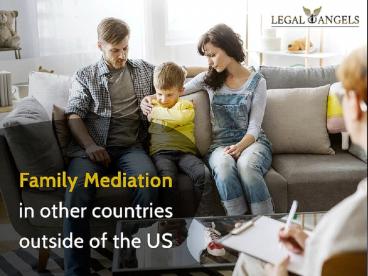Family Mediation in other countries outside of the US - PowerPoint PPT Presentation
Title:
Family Mediation in other countries outside of the US
Description:
In recent articles I spoke about Family Law Mediation in Los Angeles California and the United States but what is the rest of the world doing? – PowerPoint PPT presentation
Number of Views:72
Title: Family Mediation in other countries outside of the US
1
(No Transcript)
2
In recent articles I spoke about Family Law
Mediation in Los Angeles California and the
United States but what is the rest of the world
doing? The UK mediation has seen a rise since
the Children and Families Act of 2014 when it
made it mandatory for separating couples to go
through a Mediation Information and Assessment
Meeting (MIAM) before hearing in the
Court. Since the early 1980s a number of
institutions in South Africa have championed
mediation. The Independent Mediation Service of
South Africa (IMSSA) was established in 1984. It
trained mediators who then worked through Local
Dispute Resolution Committees set up as part of
the National Peace Accord. Initial training was
undertaken by the UK's ACAS. IMSSA covers
mediation within unionised environments.
Informal processes that engage a community in
more holistic solution-finding are
growing. After 1995, the country established
mediation agreements binding in law. The process
has grown from generally covering collective
agreements such as for wages or terms and
conditions, to encompass more individual matters
including dismissal.
3
- In Australia mediation codes of conduct include
those developed by the Law Societies of South
Australia and Western Australia and those
developed by organizations such as Institute of
Arbitrators Mediators Australia (IAMA) and
LEADR. Australia did not adopt a national
accreditation system, which may lead to a bad
choice of mediators. - The Australian government claimed the benefits of
mediation to include the following - Cost saving
- Reduced polarization
- Education
- Broader issues vs the courts
- Greater access to justice
- More control by disputant over the process
- The European Commission has promulgated codes of
conduct for mediators. - In Canada codes of conduct for mediators are set
by professional organizations. In Ontario three
distinct professional organizations maintain
codes of conduct for mediators. The Family
Dispute Resolution Institute of Ontario and the
Ontario Association of Family Mediators set
standards for their members who mediate family
matters and the Alternative Dispute Resolution
Institute of Ontario who sets standards for their
members.
4
The Alternative Dispute Resolution Institute of
Ontario, a regional affiliate of the Alternative
Dispute Resolution Institute of Canada, uses the
code of conduct from the federal organization to
regulate the conduct of its members. The Code's
three objectives are to provide guiding
principles for the conduct of mediators to
promote confidence in mediation as a process for
resolving disputes and to provide protection for
members of the public who use mediators who are
members of the institute. In France,
professional mediators have created an
organization to develop a rational approach to
conflict resolution. This approach is based on a
"scientific" definition of a person and a
conflict. These definitions help to develop a
structured mediation process. Mediators have
adopted a code of ethics which guarantees
professionalism. In Germany, due to the
Mediation Act of 2012, mediation as a process and
the responsibilities of a mediator are legally
defined. Based on the German language and the
specific codification it has to take into
account, that all persons who "mediate" in a
conflict (defined as facilitation without
evaluation and proposals for solution) are tied
to the provisions of the Mediation Act even if
they call their approach/process not mediation
but facilitation conciliation, conflict
counseling, consulting, conflict coaching or
whatever else.
5
For example, according to sec. 2 and sec. 3 of
the German Mediation Act, the mediator has
certain information and disclosure obligations as
well as limitations of practice. In Germany
"certified mediators" from Sept. 1, 2017 must do
a minimum of 120 hours of initial specialized
mediator training as well as case supervision and
further ongoing training of 40 hours within 4
years. Beyond this basic qualification, the
leading mediation associations have agreed on
quality standards higher than the minimum
standards of the national regulation to certify
their mediators. To become an accredited mediator
of these associations one has to complete an
accredited mediation training program of a
minimum of 200 hours incl. 30 hours of
supervision as well as ongoing training (3040
hours within three years). Within the United
States, the laws governing mediation vary by
state. Some states have clear expectations for
certification, ethical standards and
confidentiality. Some also exempt mediators from
testifying in cases they've worked on. However,
such laws only cover activity within the court
system. Community and commercial mediators
practicing outside the court system may not have
such legal protections. State laws regarding
lawyers may differ widely from those that cover
mediators. Professional mediators often consider
the option of liability insurance.
6
Conflict resolution systems are always culturally
specific and in the last 20 years alternative
conflict resolution systems in Nordic countries
have become more common. We are seeing them in
Mexico now and many other countries as well as
International mediation especially in the 2000s.
New mediation systems have developed and also the
caseload in mediation has increased. If you
have had any experience in Mediating in another
country we would like to hear your experience
good or bad to make ours more helpful. After all
it takes a village! In this case it takes the
world.. Article Resource - https//www.legalang
elsmonitoring.com/post/family-mediation-in-other-c
ountries-outside-of-the-us































